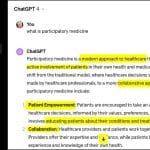The lab test result data access rule is finally final. See the HHS press release and the final rule, which is scheduled to be published on Thursday.
What does this mean? In a nutshell, patients in all 50 states are now guaranteed the right to access the results of tests conducted by freestanding labs. (The right to test results from labs within hospitals, other health care facilities and physician offices has already been in place under HIPAA, and a handful of states have already guaranteed direct patient access to freestanding lab test results.) The compliance date for the rule is eight months out, in early October, in order to give labs time to put necessary processes into place.
What exact changes were made to the regs? This was a surgical strike. The Clinical Laboratory Improvement Amendments (CLIA) regulations were revised to permit labs to provide results to patients, and the HIPAA regulations were revised to eliminate lab test results from the (very short) list of records not covered by HIPAA’s patient access rule. Thus, if a patient asks, CLIA permits and HIPAA requires that a lab provide the results.
Is this significant? Yes, it is. This is a notable development because it was prompted not by legislation (the usual culprit when it comes to regulatory revisions) but by persistence on the part of patient advocacy groups and evolution in thinking within government. The final regulation has been a long time coming. It was originally published as a proposed rule more than two years ago — see e-patients.net post about the proposed rule. While it has been supported by many interested parties, including the Society for Participatory Medicine, there was significant opposition to the rule from organized medicine on the grounds that unmediated information could be misinterpreted by patients and could otherwise be problematic. The rule was held up in the final stage of review — at OMB, which reviews the projected cost burden of proposed regulations — for five months (that’s at least 2-3 months longer than expected).
Under HIPAA, health care providers have up to 30 days to respond to patient requests for health care records, and freestanding labs will now join imaging centers, physician offices, hospitals, clinics and other providers in complying with this requirement. Labs, like other providers, may charge patients for the cost of providing records. Given the 30-day response period, there should be plenty of time for physicians to contact patients directly about potentially worrisome test results.
Since most, if not all, of the data at issue here will be stored and transmitted electronically, it is possible — and perhaps even likely — that many test results will be transmitted to patients in less than 30 days. Some of the health care organizations that already facilitate delivery of this sort of information do it automatically and electronically.
That’s the vision of the future for the engaged patient: frictionless sharing of information. Coming soon to a lab near you.
David Harlow is a health care lawyer and consultant at The Harlow Group LLC, and chairs the Society for Participatory Medicine’s public policy committee. Check out his home blog, HealthBlawg. You should follow him on Twitter: @healthblawg.






Well done, David! Both the post and your effective advocacy!
I can’t emphasize enough how important this is, and how harmful the establishment’s resistance has been. Despite physician concerns about whether “patients can handle it,” the unfortunate reality is that physicians pretty much work in a world that lacks reliable processes to guarantee that problems get noticed. A key part of the testimony on this was that patients have DIED when a lab result got misfiled.
Another key element was testimony that despite those physician concerns, in places where patients have had access, patients have loved it and haven’t freaked out. Over and over, when physicians have said “We need control – patients are weak” they’ve been shown wrong by the evidence.
Some related items:
JAMA article, Dec. 2011: Should Patients Get Direct Access to Their Laboratory Test Results? An Answer With Many Questions
“In the outpatient setting, between 8% and 26% of abnormal test results, including those suspicious for malignancy, are not followed up in a timely manner.1,2 Despite the use of electronic health records (EHRs) to facilitate communication of test results, follow-up remains a significant safety challenge.”
Nearly One-Third of Physicians Report Missing Electronic Notification of Test Results (from one of the authors of the above, but on a different angle – 29%+ of docs report missing some notifications.)
“Our data suggest that PCPs using comprehensive EHRs are vulnerable to information overload, which might lead them to miss important information,” the study concludes.
Physicians Frequently Fail to Inform Patients About Abnormal Test Results – Archives of Internal Medicine, 2009
I applaud the government people involved in this – the Office for Civil Rights, which administers HIPAA, and ONC, which regulates health data – for this decision, which clearly is totally oriented around the patient’s needs, and totally evidence-based.
And for those clinicians who resisted it: please, please, look at the evidence and as yourself about the patient harm that’s resulted from undelivered test results. Not to mention that every penny spent on those tests went in the toilet because nobody saw the results.
The world of healthcare is changing for the better. Thanks to all who’ve done this work.
Thank God!
Except for Cologuard. They will only tell you what you already know, that a test was positive. They refuse to reveal exactly what was positive. Was it Guaiac positive? Exactly what DNA tested positive? Consumers are still kept in the dark my companies making millions off of screenings.
Except when you go to the trouble to request a form, wait for the form, send back the form, wait for the results to arrive, and then are only informed of what you already know: that the test was positive.
Cologuard is obtuse, disrespectful, and does not respect right to know. They are making millions. So why can they not just reveal POSITIVE FOR:what the test was positive for? A simple Guiac + or EXACTLY what DNA was positive?
I cited the 2009 journal article in the S4PM comments and it was cited in the official commentary on the final rule.
As a former lab director, I think the labs will be happy about this too. Not only was it kind of embarrassing to tell patients they couldn’t have their own information (and engendered ill-will), but, as you mention Dave, it will provide a sort of double check on the well-known problem of doctors missing results. I remember tying ourselves into knots trying to formulate a policy concerning the lab’s responsibility to notify doctors of significant post-discharge lab results (i.e. tests ordered before discharge but the result comes back after discharge.) Just think about the logistics involved – does the lab have to talk to the Dr. directly? What is significant? What to do with the doctor who complains we are bothering him on a weekend? On and on.
Not that this policy will obviate those necessities – better office processes are still mandatory – but at least it will help. No one cares about YOUR results more than YOU.
This is excellent, thank you David!
30 days is too long, and release won’t shorten until it’s required. So ruling is 80% there. Peoples’ 30-day angst will drive down the time delay.
The JAMA Commentary by Giardina & Singh are basically against test release, because of (1) patient worry, (2) more physician work and (3) lack of evidence. Yet Singh et. al. has done the research to show that test results are missed and patient safety is at risk.
Really?
The 2009 study in Archives of Internal Medicine shows that a small but significant number of electronic notifications to physicians about abnormal imaging tests go without review.
Really?
Yet the authors comments include no solutions related to sharing information with patients. In fact, they state, “This underscores the need for a multidisciplinary approach involving human-computer interaction and informatics.” [meaning: EHR-doctor solutions]
Really?
Link to paper:
http://www.ncbi.nlm.nih.gov/pmc/articles/PMC2919821/
I am thrilled with this, as I have asked for lab and imaging results be sent directly to me for years. Of course, I have always known that the answer for the labs was a big, fat NO, but continued to ask and pester to make a statement. When I was ill, I saw my doctor flipping back and forth 4-5 times looking for data, focusing on one measure only and thereby missing the trends that became apparent to me when I really looked through the labs. This move will empower the patient, and may trigger even more apps and such that teach the patient the impact of the values. Glad that I am considered a grown-up, at last!
Although I haven’t had much resistance to my requests for medical records myself, I just want some clarification – if blood test results, for instance, are ready in a few days, both the independent lab or the doc has 30 days to provide a written copy?
A verbal to me is never enough – have suffered late cancer diagnosis to information missed as well as threatening side effects that were glossed over…
Thanks for all the good work!
The independent lab now (well, come October) needs to provide test results directly to you within 30 days of request.
Why would a doctors office have test results released electronically to a patient as access to their health records and have dufferent information in the iffice that does not show in the electronic file?
Respetfully,
Michelle Miller
Hi i was just told by a lab where i tested that they would not give me my results because i wasnt the one that paid. I feel the results were falsifyed by the person who paid
Please advise what one should do when a doctor’s offices refuses to send test results upon the patient’s request.
I had an untrasound done on my thyroid at the hospital as prescribed by an ear, nose and throat doctor. I do not care to return to this doctor as he tried to get me to consent to surgery and testing not related to my reason for being there (guess I looked like a cash cow that day). A copy of the ultrasound result was sent to my primary care doctor, but their office refuses to send it to me, saying the doctor that ordered the test has to be the one to provide me with a copy. Is this true, are they allowed to have that policy?
What is the penalty to Lab and monetary reward to patient by the CLIA and HIPPA enforce Fed Law, when a Lab refuses to send results at the request of the Lab customer’s request. Court reward to patient? Saying the Dr. must put written authorization on the Blood work request the Doctor provided the patient to provide to the lab at time of blood draw?
I Suffer from low adrenal. Mayo Clinic Dr after 27 day in 03′ told mr I would die. I deteriorated horribly painful and miserable life from 97 through 04″. I am having a relapse of adrenal, Cortisol, DHEA. I am very scared of my future because of what happened and I have learned about this aweful disease. The stages of PAIN, PARALYSIS, NUMBNESS, BRIAN FUNCTION LACKING, ETC IS NO WAY TO LIVE. I have read a shot can be given to me, but none of the 2 Drs. I have seen in 6 weeks has said a word. My headache is really bad this morning. Unusual this bad.
This disease caused my to be unable to earn 6 figure income and employ 5 wonderful assistants in my consulting/sales business 25 years in Tampa Bay F. , plus referrals in many states.In 2000, plus the disability income policy I paid for did not pay, even after 3 physicians wrote letters with my claim that I was totally disabled. If eligible dur to my Civil Rights being abused by the Lab, My wife and I dearly nedd the ruling by court to get a monetary award from the courtif that id part of the intent of this law being passed in favor of the individual to protect their rights. If no penalty to the lab, where is the impetuse to act upon the Law expedicously in favor of the patient/customer of the lab. This passed in 14′ and I was refused this week by the Tech 2018′ 4 years latter. Certainly the Lab headquarters knows the law and should pay for the stress and suffering to the customer/patient. I am losing muscle mass daily. Mental issues also daily. My family Dr was to booked to see me when I called 2 months ago and a very youg Dr. filling in for a partner Dr on maternity leave. Nice mannersby the Dr. Listened well, but a few mistakes in ordering the MRI of my C vertebraes, which was known at the time the appointment was scheduled to see the Dr. We Met at 10 am and it took me 3 1/2 hours to get the Dr.’s mistakes corrected on the MRI request sheet, when I took it to the Radiology/MRI Dept of the out patient at the hospital across the street from the Dr.’s office.Back and forth from office to office and on my cell phone. Unbelievable stress with thiss ordeal and hoe can you have trusst in a physician that is unable to properly order an MRI. I canceled the appointment to hear the report results because I have no trust in that DR. Mt family Dr in that office has the report and An appointment in mid July.
Well, I called my family Dr. to tell his recpt., That I was having significant muscle mass loss. I see the Dr. due to that on 6-14 9am. My neck has been getting worse since Oct., Nov. My R eye started hurt in Oct slightly and much worse now. Put a patch over it for an hour last week watching tv. This happened back in 95′ and got really bad and no Dr. ever found the cause. I do not want to go throught that pain and life’s interference again if at all possible. I have a lab test result from an internet organization,$119.00 that proves my Cortisol is tremendously low and DHEA is soaring high….that’s stress. Thank you for you time, patients and pray for your help with the lab denial of the civil rights. Ted Walters
Quest just denied me this right and said I could not see until doctor did. This is in direct conflict with law and I am filing complaints with CLIA and other agencies.
THey called my doctor against my wishes, strained the relationship and also have sent me encrypted messages in the past upon request, but depending on which inept rep you get, you get arguments and talked down to like a dog with no offer of help. When you escalate, the rep will lie and do nothing to help and then call doctors office and say “Oh, they want the test before you,” using the lack and ignorance of statues to elicit a “no” then use that to discard your claim and their duty to perform.
I have taken this to Michele Licwkinko and Joanna in the customer care team. I would be happy to forward emails showing the backpedaling, lies and lack of honoring patient wishes. This is something CLIA labs need to understand. They don’t get to decide. The law does. Follow it.
I have searched and searched for any info on this. I am having a terrible time getting my lab emailed to me. I get my INR checked 1-3 times monthly for a dangerous blood clotting disease I have. I’m given a consent to fill out each time I go and my lab draw team faxes it in. I also take a pic of it and email it to the “compliance officer”. Big joke. I use Boyce and Bynum in Missouri and have for years. I have never had an issue until last year when I found out about my disease. The strange thing is THEY are the ones that offered this service after we were having problems with them even getting my results to my doc. For instance, I would have them drawn on Thursday and if I didn’t watch them close they didn’t fax my result to my doc by end of day on Friday. So if O needed an adjustment in my meds I didn’t get it until the next Monday… maybe. So when they offered the email situation I took them up on it. I received 1 last Spring I believe without asking for it. I have not received any more. The one person providing the service quit or was fired. Now I’m dealing with this compliance officer who also does not send them to me. Again, bloodwork Thursday, no results and my nurse FINALLY drug the results out of them late Friday afternoon and called me. My lab values were very high… entering a dangerous state. I use them because of the cost. It’s so much cheaper than anywhere else and I have a high deductible. I’ve used them for 30 years. Sorry for the long ramble, but would love to know WHO I CAN CONTACT to turn in a complaint aside from the lab. Apparently they are being purchased by Quest. I pray they are better. I’m not one to rock the boat but I am truly sick of it!
It is simply outrageous that you can’t get your blood results back from a lab at the same timeframe that your doctor gets those results. I guess we must be protected by the medical genius gods.
If only we were being monitored by the medical genius gods! Unfortunately NOT!. I had labs drawn recently for a liver problem. I set up the patient portal as directed and got 1 lab result out of a great many. Since then have been unable to access the portal. I was told at the Dr. office I couldn’t see my labs until the doctor had seen them. The law that states I can access my own labs was passed in 2014 and this is over 5 years later! I know I need my liver to live! I am worried! I don’t want to live like this. I am also furious! I worked as a RN with a bachelors degree for 37!years and always made sure the docs saw the most important labs way before the normal results were seen by them. So I am retired and now I cannot see my own labs until after my doctor gives permission? WHY??? I’m not an idiot! I resent being treated as a child. It’s too late in my life to obtain an MD degree. What do I do? I hate violence but I feel violent and violated and condescended to.
I wonder what one can do if the doctors do not do this — who should I complain to? And what if – as in my case – the State Department of Health /Medical Commision refuses to investigate — a lot of lawyers want a whole leg to be missing to take a case no matter how many toes or how much emotional damage they have done to one –Any thoughts? Please email me — I would deeply appreciate it — in the meantime you can read of a dozen doctors in a row not reading my lab – but claiming they did — why? It boggles my mind – over 16,000 people have visited my website in the past 7 months — but that’s no justice at all so far… http://www.SwedishLies.com is the siste — take a look if you get a chance.